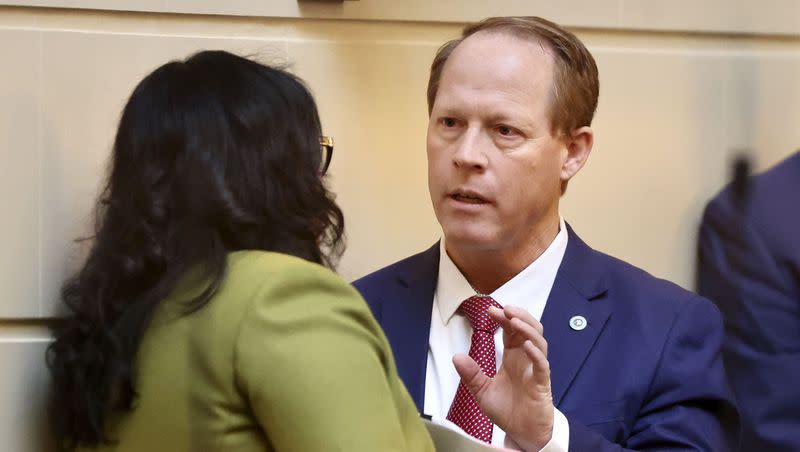What the latest version of Utah’s DEI bill will — and won’t — prohibit

- Oops!Something went wrong.Please try again later.
Utah Senate Republicans unanimously chose to advance a bill reforming diversity, equity and inclusion programs at public institutions on Wednesday in a preliminary floor vote before a final vote scheduled for Thursday.
Here’s what the bill will and won’t do: the bill, HB261, aims to outlaw DEI trainings, requirements, programs and offices at public universities, schools “or any other institution of the state,” if they engage in “prohibited discriminatory practices.” State funding can be withheld if institutions fail to address incompliance with the restrictions. The bill would also ensure campus resource centers are available to all students at “higher risk” of incompletion.
The state Senate floor sponsor, Sen. Keith Grover, R-Provo, fielded a series of questions prior to the vote, mostly from Democratic lawmakers. Concerns centered around how the bill’s broad scope would affect teaching strategies, data collection, public-private partnerships and healthcare initiatives targeted toward specific identity groups.
Sen. Karen Kwan, D-Murray, articulated a worry shared by others during the House and Senate committee hearings. She said regardless of the intention of the legislation, it contradicted research on the reality of “systemic racism” and would send a negative message to individuals in certain identity groups.
Related
“I also believe that our communities feel as though, even though they may never read this bill, they feel as though they’re being erased and that their safe spaces on campus will go away,” Kwan said.
Grover, a former administrator in the Alpine School District, offered lawmakers similar assurances to the ones given by the bill’s sponsor, Rep. Katy Hall, R-South Ogden. Namely, that current practices may continue unless they violate the bill’s list of “prohibited discriminatory practices.”
However, in response to criticism from Sen. Nate Blouin, D-Salt Lake City, Grover said it’s difficult to know all the changes public school systems, or government entities, will need to make to come into compliance with the law if it passes. For that reason, Grover called it a “process bill” and said to expect revisions based on university and community feedback during the 2025 legislative session.
“The reason we’re doing this now is because it needs to happen. We need to now start providing equality of opportunity for all students,” Grover said.
What does the Utah DEI bill prohibit?
Here’s what the current version of HB261 prohibits. The prohibitions apply to institutions of higher education, the public education system and government employers, which includes any department, agency or political subdivision of the state.
Under HB261, a public institution in the state of Utah cannot:
Ask for a “prohibited submission” with respect to employment status, admission to an institution, participation in a program, or qualification for state financial aid. A prohibited submission, sometimes referred to as a diversity statement, is a document that requires an individual to articulate their view on a policy “that promotes differential treatment based on an individual’s personal identity characteristics,” or, specifically, topics like anti-racism, critical race theory and intersectionality.
Give special preference to someone who provides a “prohibited submission.”
Implement policies — with some exceptions for athletics — that promote differential treatment in hiring, admissions, promotions and program participation based on “personal identity characteristics.” These characteristics include “race, color, ethnicity, sex, sexual orientation, national origin, religion, or gender identity.”
Engage in initiatives or mandatory trainings that assert that individuals with a particular personal identity characteristic are inherently superior, privileged, oppressed or culpable for past actions; that “meritocracy is inherently racist or sexist;” that “socio-political structures are inherently a series of power relationships and struggles among racial groups;” or promote “resentment between, or resentment of, individuals by virtue of their personal identity characteristics.”
Maintain offices with the title “diversity, equity, and inclusion,” or positions established to implement any of the practices outlined above.
Employ a third-party to develop, promote or implement any of the practices outlined above.
Related
Utah lawmakers say they’re creating national model for ‘positive’ DEI alternative
Utah Democratic lawmakers respond to DEI ban, transgender bathroom bill
What does the Utah DEI bill not prohibit?
The bill does not prohibit a public institution in Utah from:
Accepting a “prohibited submission,” like a diversity statement, if it is required by federal law. But a public institution must limit its consideration of the information to the bare minimum required under federal law.
Establishing policies that are necessary to comply with state or federal laws relating to “discrimination or harassment.”
Reviewing an applicant or employee’s research, teaching agenda, coursework, or other factors relevant to a resume.
The bill’s prohibitions do not apply to:
Academic research.
Academic course material.
Requirements needed to stay in compliance with, or maintain eligibility for, athletics, accreditation, grants and federal programs.
How will Utah’s DEI bill affect healthcare?
During Wednesday’s floor debate, Senate Minority Assistant Whip Jen Plumb, D-Salt Lake City, a physician at Primary Children’s Hospital, asked Grover whether HB261 could impede special initiatives or programs targeting particular demographics because of their heightened susceptibility to certain illnesses.
Grover said such efforts should not be affected by the bill. But he committed to develop “additional language” to include in the bill before a final vote to guarantee that race-specific healthcare programs would remain untouched.
“This bill is essentially all about equality of opportunity,” Grover said at the conclusion of Wednesday’s floor debate. “And I continue to believe that this bill will promote one nation, under God, with liberty and freedom for all.”
Related

